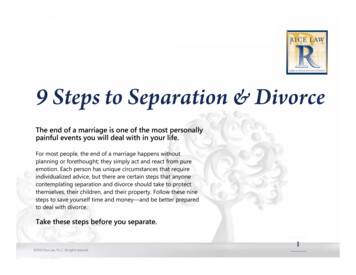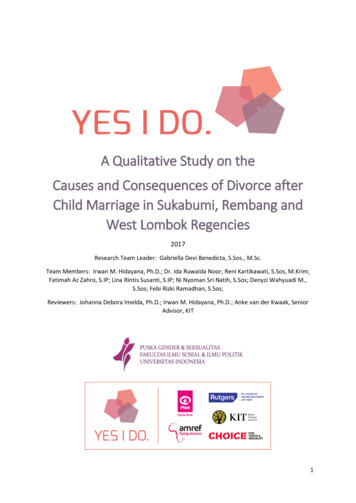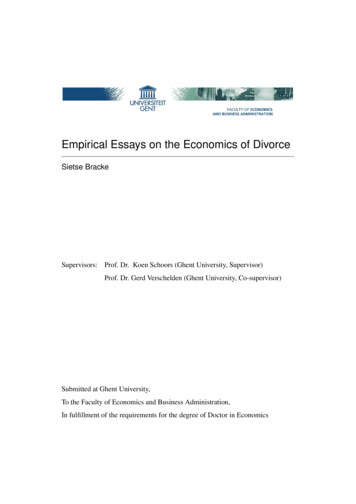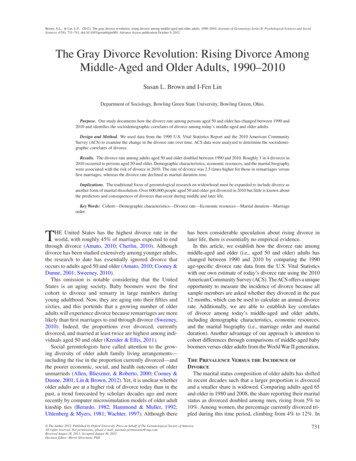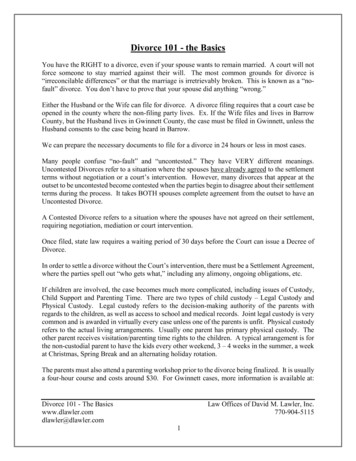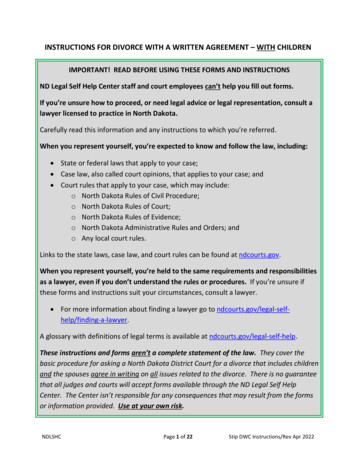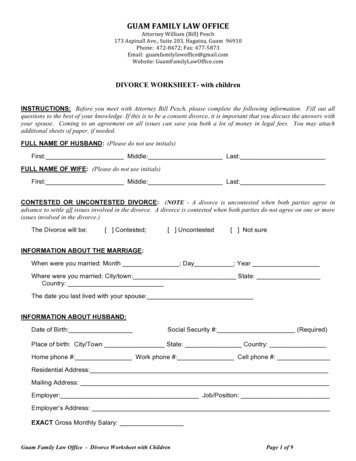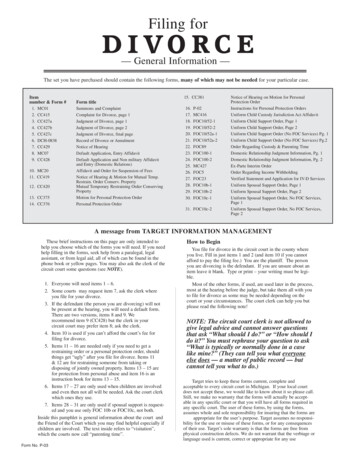
Transcription
Filing forD—IGeneralVORCEInformation —The set you have purchased should contain the following forms, many of which may not be needed for your particular case.Itemnumber & Form 0838CC429MC07CC42810. MC2011. CC41912. CC42013. CC37514. CC376Form titleSummons and ComplaintComplaint for Divorce, page 1Judgment of Divorce, page 1Judgment of Divorce, page 2Judgment of Divorce, final pageRecord of Divorce or AnnulmentNotice of HearingDefault Application, Entry AffidavitDefault Application and Non military Affidavitand Entry (Domestic Relations)Affidavit and Order for Suspension of FeesNotice of Hearing & Motion for Mutual Temp.Restrain. Order Conserv. PropertyMutual Temporary Restraining Order ConservingPropertyMotion for Personal Protection OrderPersonal Protection Order15. -2FOC10c-131. FOC10c-2Notice of Hearing on Motion for PersonalProtection OrderInstructions for Personal Protection OrdersUniform Child Custody Jurisdiction Act AffidavitUniform Child Support Order, Page 1Uniform Child Support Order, Page 2Uniform Child Support Order (No FOC Services) Pg. 1Uniform Child Support Order (No FOC Services) Pg.2Order Regarding Custody & Parenting TimeDomestic Relationship Judgment Information, Pg. 1Domestic Relationship Judgment Information, Pg. 2Ex-Parte Interim OrderOrder Regarding Income WithholdingVerified Statement and Application for IV-D ServicesUniform Spousal Support Order, Page 1Uniform Spousal Support Order, Page 2Uniform Spousal Support Order, No FOC Services,Page 1Uniform Spousal Support Order, No FOC Services,Page 2A message from TARGET INFORMATION MANAGEMENTThese brief instructions on this page are only intended tohelp you choose which of the forms you will need. If you needhelp filling in the forms, seek help from a paralegal, legalassistant, or from legal aid, all of which can be found in thephone book or yellow pages. You may also ask the clerk of thecircuit court some questions (see NOTE).1. Everyone will need items 1 – 6.2. Some courts may request item 7, ask the clerk whereyou file for your divorce.3. If the defendant (the person you are divorcing) will notbe present at the hearing, you will need a default form.There are two versions, items 8 and 9. Werecommend item 9 (CC428) but the clerk in yourcircuit court may prefer item 8; ask the clerk.4. Item 10 is used if you can’t afford the court’s fee forfiling for divorce.5. Items 11 – 16 are needed only if you need to get arestraining order or a personal protection order, shouldthings get “ugly” after you file for divorce. Items 11& 12 are for restraining someone from taking ordisposing of jointly owned property. Items 13 – 15 arefor protection from personal abuse and item 16 is aninstruction book for items 13 – 15.6. Items 17 – 27 are only used when children are involvedand even then not all will be needed. Ask the court clerkwhich ones they use.7. Items 28 – 31 are only used if spousal support is requested and you use only FOC 10b or FOC10c, not both.Inside this pamphlet is general information about the court andthe Friend of the Court which you may find helpful especially ifchildren are involved. The text inside refers to “visitation”,which the courts now call “parenting time”.Form No. P-03How to BeginYou file for divorce in the circuit court in the county whereyou live. Fill in just items 1 and 2 (and item 10 if you cannotafford to pay the filing fee.) You are the plantiff. The personyou are divorcing is the defendant. If you are unsure about anitem leave it blank. Type or print – your writing must be legible.Most of the other forms, if used, are used later in the process,most at the hearing before the judge, but take them all with youto file for divorce as some may be needed depending on thecourt or your circumstances. The court clerk can help you butplease read the following note!NOTE: The circuit court clerk is not allowed togive legal advice and cannot answer questionsthat ask “What should I do?” or “How should Ido it?” You must rephrase your question to ask“What is typically or normally done in a caselike mine?” (They can tell you what everyoneelse does — a matter of public record — butcannot tell you what to do.)Target tries to keep these forms current, complete andacceptable to every circuit court in Michigan. If your local courtdoes not accept these, we would like to know about it so please call.Still, we make no warranty that the forms will actually be acceptable in any specific court or that you will have all forms required inany specific court. The user of these forms, by using the forms,assumes whole and sole responsibility for insuring that the forms areappropriate for the user’s purpose. Target assumes no responsibility for the use or misuse of these forms, or for any consequencesof their use. Target’s sole warranty is that the forms are free fromphysical construction defects. We do not warrant that the verbiage orlanguage used is current, correct or appropriate for any use
5. What amount, if any, should one party contribute towards thesupport of the other, either permanently or temporarily?(spousal support—alimony)6. How will the children’s medical, dental and other health careexpenses be paid? (health care coverage)7. Will the wife take back her maiden name? (restoration ofmaiden name)8. Will children be allowed to move from the State of Michigan?(domicile)Divorce issues may be resolved in the following ways:1. The parties may be able to reach an agreement by themselvesor by talking to their attorneys.2. Mediation is available through the Friend of the Court andprivate agencies to resolve the issues of custody and visitation.3. In some counties, a Friend of the Court referee may hear theissues and make a recommendation to the judge.4. The judge may help in settling a matter by having a pretrial orsettlement conference.5. The judge will hold a hearing or trial on the issues that havenot been resolved.Copies of all papers filed in a case must be given to the Friend ofthe Court by the person bringing the action or his or her attorney.Recommendations on custody, visitation and child support will bemade by the Friend of the Court office, if the circuit court orders theoffice to do so.whatsoever.The following are excerpts from Ingham County’sFriend of the Court HandbookProcedures of the CourtProcedures of the CourtAny individual wishing to start a domestic relations action mustfile the correct papers according to specific rules (Michigan CourtRules). There may be many complicated issues or rules involved in adomestic relations case. Although the court cannot require a party touse an attorney to start or defend an action, it may be advisable tohave an attorney file the correct papers and follow specific rules.Plaintiff’s ComplaintEvery domestic relations matter begins with the plaintiff filing acomplaint or petition which asks the court to grant an order. Forexample, a complaint may ask the court to grant a divorce, providefor child or spousal support, start an out-of-state support collectioneffort, or grant an order for custody of a child. The defendant is theperson whom the complaint is filed against.ServiceThe court rules provide that the defendant be served with a copy ofthe complaint and summons. The summons is a document whichlegally asks the person complained against to answer the complaint.This must be delivered to that person in such a way as to give themnotice of the action against them.The most typical ways to give notice are for a third party to personally hand the papers to the defendant or by sending them asrequired by Michigan Court Rule.Ex-Parte Interim Orders (Orders entered by the court withoutthe benefit of a hearing)In some cases a court may immediately enter a child support orderupon the request of a plaintiff or defendant.The party directed by the court to make payments may request thecourt to hold a hearing to change its ex-parte interim order by filing amotion within 14 days after they receive the order. If a motion is notfiled within 14 days, the order automatically becomes a temporary3order.Defendant’s Answer to ComplaintIf the person served does not file an answer to the complaint within the time permitted by Michigan Court Rule, (21 days or as shownon the summons, form # MC01) they may lose the right to have theirconcerns heard by the court.This could result in the court entering an order giving the Plaintiffeverything he or she requested in the complaint.Temporary OrdersAfter the complaint has been filed, matters such as temporary custody, visitation and amount of support, and in some cases, spousalsupport, need to be decided. Either party, or in some cases the Friendof the Court, may file a motion with the court asking for appropriateorders. If a hearing before a referee or judge is scheduled, both parties will be notified of the time and place. On that date, they can present their position to the court. The decision made at that hearing bythe court is written down by one of the attorneys. This is given to thejudge for entry (signing the order), and made an order of the court.NOTE: Only a judge can enter orders or judgments; a referee canhear motions, but can only propose recommended orders to the judge(See referee section — page 7).Domestic Relations ProcessDIVORCEA person wanting to end his or her marriage must have a circuitcourt enter an order ending the marriage. To grant the divorce, thecourt must find that there has been a breakdown in the marriage relationship to the extent that the parties cannot live together as husbandand wife. At least one of the parties must appear in court to show thatthis breakdown really does exist. In Michigan, a divorce can begranted even if one of the parties does not want the divorce.A divorce ends the legal relationship between a husband and wife.The divorce does not end the family relationship, even though therelationship will change.Many decisions must be made before a divorce is granted. Thesedecisions may include:1. Who will make decisions, provide daily guidance and take careof the children? (custody)2. What contact will children have with a parent they don’t livewith? (visitation)3. How should the property gathered during the marriage bedivided? (property settlement)4. How will financial responsibilities for the children be divided?(child support)Reconciliations and DismissalsNot every divorce matter that is started ends in a divorce. If theparties are attempting to work out their differences and wish to haveenforcement of their court orders suspended, they must provide thecourt and the Friend of the Court with written notice of their RECONCILIATION. A reconciliation notice does not dismiss a divorceaction.If the parties have resolved their differences and wish to stop thedivorce action, they must file a Voluntary Dismissal (form # MC09)with the circuit court and provide a copy to the Friend of the Court.In either situation, if children have received public assistance,plans to pay any back child support must be made with the Friend ofthe Court.Judgment1.
The Department of Social Services makes referrals whether or not aparty receives public assistance. A party has the right to contact a private attorney to file the paternity action.Once paternity has been established, the court may order childsupport, reimbursement of medical expenses for the birth of the childand on-going health care expenses of the child.Visitation (provision for the father or mother to see the child) isnot automatically ordered in paternity cases. However, if a parentwho has a paternity action pending would like custody or visitation,he or she should advise the Prosecuting Attorney or their privateattorney before the entry of the paternity order.The Friend of the Court cannot help with visitation problemsunless a court order for visitation has been established by the court.If the mother and father marry after the court enters the paternityorder, they must give a copy of the marriage license to the Friend ofthe Court to end the support order. Arrangements must be made topay all money owed to any public agency.A judgment contains the orders of the court which address support,visitation, custody, property and other related issues.There is a 60 day waiting period for divorce cases without childrenand a 6 month waiting period for divorces where there are minorchildren.After the waiting period is over the judge may grant a divorce.Some of the sections in the divorce judgment can be changed by thejudge after it has been entered (See modification of judgment —below). Once a judgment has been entered, parties must comply withits terms.If a party is dissatisfied with the judgment, he or she may wish tocontact an attorney. Once an order has been entered, a party has 21days in which to file an appeal.Modification of a JudgmentAfter a judgment has been entered in a divorce action, there aresome orders that can be modified (changed). These could include:custody, visitation, support, and change of domicile. A change canonly occur if: (1) both parties have signed an agreement (stipulationand consent agreement) which, if approved by the court will beentered as an order; OR (2) a motion has been filed, a hearing hasbeen held and the court enters an order granting a change.The Friend of the Court has a responsibility to petition the court incertain circumstances for child support and visitation modification(see child support section — page 4 and visitation sections —page 5).INTERSTATE ACTIONSIf the parent required to pay support leaves the State of Michigan,he or she must continue to pay support through the Friend of theCourt.If the child support payments stop, the parent receiving support hastwo choices:(A) Contact either the Prosecuting Attorney after referral fromDepartment of Social Services (see above), or a private attorney torequest that they file a Revised Uniform Reciprocal Enforcement ofSupport Act (RURESA) action. A RURESA order establishes a support order in the state where the non-custodial parent lives.To begin the RURESA action, the custodial parent should have thefull name, date of birth, social security number, the last knownaddress of the person who should be paying support and a copy of allcourt orders involving the parents. If the custodial parent is not surewhere the other parent lives, the Prosecuting Attorney’s office willtry to locate him or her.Once the state in which the non-custodial parent lives enters itssupport order, authorities in that state are responsible for itsenforcement.Each state has control within its own boundaries. A support orderestablished in another state under RURESA does not affect theamount owed under a Michigan order. A delinquent payer whoreturns to Michigan can be brought before the court for failure to payunder the Michigan order;(B) Register the Michigan order in the state where the paying parent lives. The Friend of the Court or a private attorney can assist withthis process.After the Michigan order is registered in the state where the payingparent lives, it becomes an order of the court in the other state, to beenforced by the other state.In some states, registering the order includes registering the custody and visitation orders. This means the court in the other statecould change the visitation, custody and/or support order if asked.FAMILY SUPPORT ACTIONSA party who is separated from his or her spouse with no divorcepending and who has a minor child living with them, may seek toestablish a family support order under the Family Support Act (this isreferred to as an Order of Support). Generally, family support actionsare started by a Prosecuting Attorney’s office after a referral by theMichigan Department of Social Services. The Department of SocialServices makes referrals whether or not a party receives public assistance. In addition, a party can contact a private attorney to file anaction.The Friend of the Court has the responsibility to enforce all ordersof support. If the parents get back together and decide to end thefamily support order, they must contact either the ProsecutingAttorney or their attorney to obtain an Order of Dismissal. Notifyinga Department of Social Services caseworker does not end the court’ssupport order.When the Friend of the Court receives the Order of Dismissal, thefamily support order will stop. If children have received public assistance, plans to pay any back support must be made with the Friend ofthe Court.Either parent may begin a divorce action even though the court hasordered support in a family support action. The family support orderends upon entry of a Judgment of Divorce. A copy of the Judgmentof Divorce must be provided to the Friend of the Court. If delinquentsupport is owed under the family support action, plans to pay theback support must be made with the Friend of the Court.If the parties have a family support order and have also filed fordivorce, and decide to stop the divorce action, they must file anOrder of Dismissal. Filing an order to dismiss the divorce will notend the family support order.Rights and Responsibilitiesof the PartiesEach party has the right to:1. Expect the Friend of the Court to perform the duties listed inthis pamphlet.2. Request the Friend of the Court office to explain its procedures.3. Be treated with courtesy by Friend of the Court employees.4. File a grievance with the Friend of the Court office concerningan employee or office procedure.PATERNITY ACTIONSPaternity is a legal determination that identifies the father of achild born out of wedlock.Either parent can request the court to establish paternity.Generally, paternity actions are started by a Prosecuting Attorney’soffice after a referral by the Michigan Department of Social Services.2.
Custody Questions and Answers5. Consult an attorney regarding concerns.1. How do I get an order for custody?A petition requesting the court to grant you custody of your children must be filed with the court. If both parents agree and sign anagreement (stipulation and consent agreement), that agreement, ifapproved by the court, may be entered as a custody order.2. How do I change an existing order for custody?A petition to modify a custody order must be filed with the court,or the parents can sign a written agreement changing custody (stipulation and consent agreement), which if approved by the court, willchange custody.3. Do I need to have an attorney to get custody?It is not required that you have an attorney to file a petition forcustody. However, there are many complicated issues involved in acustody case and therefore you may want to have an attorney represent you. The Friend of the Court cannot file a petition for custodyfor you.4. Is there any way the court can assist us in reaching an agreement on custody?The Friend of the Court is required to provide Domestic RelationsMediation. Mediation is a process where a neutral third party assistsin voluntarily settling a custody dispute. Both parties must agree toparticipate in this process.5. Are there different kinds of custody?Yes, a number of custody arrangements are possible. The mostcommon are:(1) Joint Custody. Joint custody means an order of the court inwhich one or both of the following are provided:(a) That the children live with one parent part of the time andwith the other parent part of the time. (Joint Physical Custody)(b) That the parents both share in making decisions on important issues dealing with the children. (Joint Legal Custody)(2) Sole Custody. An order of the court which states that the children live with one parent and that parent is responsible formaking decisions on important issues dealing with the child.6. After a petition for custody has been filed, and we cannot(reach our own agreement, what does the Friend of the Courthave to do?The Friend of the Court is required to:(1) Offer mediation services to the parties.(2) Conduct an investigation and file a written report and recommendation to the court based on the factors listed in theMichigan Child Custody Act.7. Do I have the right to receive a copy of the Friend of the Courtreport and recommendation on custody?Before the court takes any action on a Friend of the Court custodyrecommendation, the Friend of the Court must provide to each partyor their attorney a copy of the report, recommendation and any supporting documents or a summary of the documents prepared or usedby the Friend of the Court.8. What will happen if I have an order for custody and the otherparent does not return the child to me as stated in the courtorder?You have several choices:(1) You can contact the Friend of the Court and request that theyenforce your order.(2) You can contact your attorney.(3) You can contact the Prosecuting Attorney and request that akidnapping charge be started if you have reason to believe thatthe other parent intends to keep the child.9. Does The Friend of The Court have a responsibility toEach party has the responsibility to:1. Inform the Friend of the Court, in writing, of changes whichaffect the way the Friend of the Court must do its job, such as:(a) Change of address; (b) Change in income status or sourceof income; (c) Changes in children’s residence.2. Provide information to the Friend of the Court office to assist itin carrying out their duties as required by law.3. Obey all orders of the court unless and until changed by thecourt.4. Keep appointments made with the office, or take the time tocancel an appointment and make a new one.5 . Treat the Friend of the Court employees with courtesy.Duties ofThe Friend of the CourtMEDIATIONThe Friend of the Court is required by law to make mediation services available to parties when there is a dispute as to custody and/orvisitation.Mediation is a process that parties can use to reach their ownagreements without going to court. The law requires that both partiesagree to use mediation. The mediator (the neutral person who helpsthe parties reach an agreement) cannot reveal to the court or anyoneelse the discussions the parties had during the mediation process. Theperson who mediates in the case cannot later investigate any disputesbetween the parties or enforce any court orders regarding the case.CUSTODYA custody order specifies with whom the child shall live.In deciding the custodial arrangements, the court must consider allof the following factors of the Michigan Child Custody Act:(a) The love, affection, and other emotional ties existing betweenthe parties involved and the child.(b) The capacity and disposition of the parties involved to givethe child love, affection, and guidance and continuation of theeducating and raising of the child in its religion or creed,if any.(c) The capacity and disposition of the parties involved to providethe child with food, clothing, medical care or other remedialcare recognized and permitted under the laws of this State inplace of medical care, and other material needs.(d) The length of time the child has lived in a stable, satisfactoryenvironment, and the desirability of maintaining continuity.(e) The permanence as a family unit, of the existing or proposedcustodial home or homes.(f) The moral fitness of the parties involved.(g) The mental and physical health of the parties involved.(h) The home, school, and community record of the child.(i) The reasonable preference of the child, if the court deems thechild to be of sufficient age to express preference.(j) The willingness and ability of each of the parents to facilitateand encourage a close and continuing parent/child relationshipbetween the child and the other parent.(k) Any other factor considered by the court to be relevant to aparticular child custody dispute.3.
investigate alleged abuse and/or neglect of a child?Allegations of abuse or neglect should be reported to the ProtectiveServices unit of your local Department of Social Services office.The Friend of the Court has a responsibility to conduct an investigation when a party files a visitation or custody petition. Allegationsof abuse or neglect should be communicated to the Friend of theCourt during the investigation process.currently receiving public assistance or there is money owed to theDepartment of Social Services, the parties cannot stop enforcementaction.Enforcement of SupportThe Friend of the Court has many options available to enforce support orders. These options include:1. Income Withholding OrdersAny income withholding order requires the payer’s (personrequired to pay support) employer or other source of income to withhold support from his or her paycheck. All support orders issued inthe state of Michigan must provide for an order of income withholding in the event delinquencies occur.If the payer lives out of state, and gets behind in making his or hersupport payments, the Friend of the Court may begin an interstateincome withholding action.In order for a Friend of the Court office to start an interstateincome withholding action, it must have the following information:(A) Name, address and social security number of payer.(B) Name and address of payer’s employer or other source ofincome.Support OrdersA support order means any order entered by the circuit court whichrequires the payment of support.Support may include: 1) child support; 2) spousal support;3) payment of expenses of medical, dental and other health care;4) child care expenses; and 5) educational expenses.Support Investigations and ReportsIf ordered by the court, the Friend of the Court will conduct afinancial investigation and make a written report and recommendation to the parties and the court regarding child support. Friend of theCourt reports cannot be used as evidence in court without the agreement of both parties. However, the Friend of the Court investigatormay be called to testify about their report and recommendation.2. Show Cause HearingIf an order for income withholding does not work, the Friend ofthe Court may begin a civil contempt proceeding by filing a petitionwith the court for an order to show cause.If a show cause hearing is held and the payer appears, the judgewill decide whether the person is in contempt and what action shouldbe taken.If the show cause hearing is held and the payer does not appear,the judge may issue a bench warrant for the payer’s arrest.Once the court issues a bench warrant, the responsibility for thepayer’s arrest lies with the local law enforcement agencies.Child Support GuidelineState and Federal law require that a child support guideline be usedby Friends of the Court and Prosecuting Attorneys when recommending appropriate child support amounts.In Michigan, a child support guideline has been developed whichconsiders both the non-custodial and custodial parent’s income.For more information about the child support guidelines currentlyin use, you may contact either the Friend of the Court or your attorney. A copy of the guideline may be available at your local library.To obtain a copy of the Michigan Child Support Guidelines,contact:State Court Administrative OfficeChild Support Guideline ManualP.O.Box 30048Lansing, Ml 489093. Tax InterceptIf back child support is owed, the Friend of the Court may requestan income tax offset.A tax offset is where any tax refund owed to a payer is sent to theFriend of the Court and applied to back child support.For more information contact the Friend of the Court.AccountingThe Friend of the Court, unless otherwise ordered by the court, hasthe responsibility to collect and forward child and spousal support tothe payee.State law requires Friends of the Court to receive, record and sendout all support payments due, current and past due not less than onceeach month.Once a year, upon a written request, the Friend of the Court shallprovide parties with a statement of the support account free ofcharge.Payments for support may be made by personal check, moneyorder, income withholding or in person at the Friend of the Courtoffice. Cash payments should not be mailed.4. LiensIn some cases, the Friend of the Court may be able to obtain a lienon a payer’s property. For more information, contact the Friend of theCourt office.Modifications of a Support OrderThe Friend of the Court is required by state law to review childsupport orders as follows:1. Not less than once every two years if the children for whomsupport is being paid are receiving public assistance.2. When on its own finding or initiative, the Friend of the Courtoffice determines that the amount of the child support ordershould be changed.3. Upon a written request from a party, not more than once everytwo years.The office must complete its support review within 60 days andmake a copy of its recommendations and supporting documentsavailable to the parties or their attorneys.If the office finds that an increase or decrease is appropriate, theFriend of the Court must petition the court for a change in the childAutomatic Support EnforcementThe Friend of the Court is required to automatically begin enforcement action against a parent paying support whose back support is inan amount equal to four weeks of support. This is to be done withoutwaiting for a complaint or request for enforcement from the personreceiving support.If both parties want to temporarily stop the Friend of the Courtfrom automatically enforcing the support order, they must file a jointwritten request with the Friend of the Court. If the custodial parent is4.
support amount.If either party has had a large increase or decrease in income, theymay wish to contact the Friend of the Court to request a review ofthe support order (see Support Modification Section — page 4).If the payer and payee can mutually agree to a change in supportorder, and sign a written agreement (stipulation and consent agreement), that agreement will be entered as an order, if approved by thecourt.Questions a
2. CC415 Complaint for Divorce, page 1 3. CC427a Judgment of Divorce, page 1 4. CC427b Judgment of Divorce, page 2 5. CC427c Judgment of Divorce, final page 6. DCH-0838 Record of Divorce or Annulment 7. CC429 Notice of Hearing 8. MC07 Default Application, Entry Affidavit 9. CC428 Default Application and Non military Affidavit and Entry .


